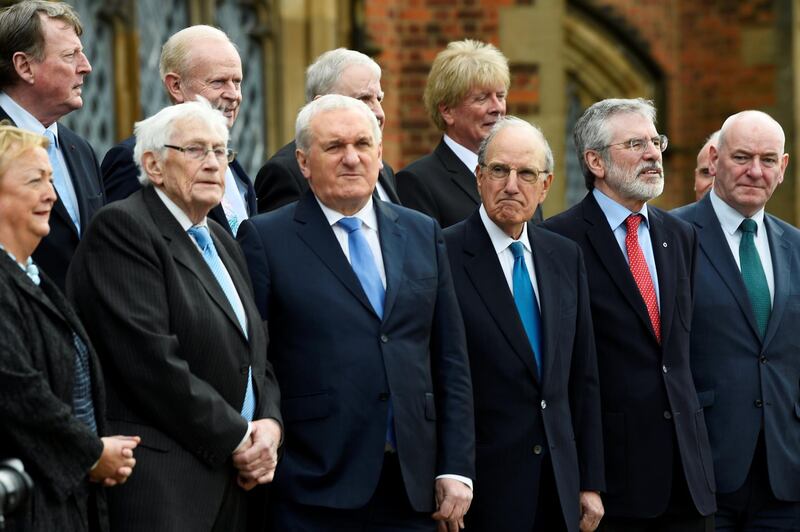The architects of the Good Friday Agreement have marked the peace deal's 20th anniversary with a series of stark warnings that peace in Northern Ireland is at risk of unravelling.
Speaking at University College Dublin on the eve of the anniversary, former US President Bill Clinton led a chorus of concern. "It is so easy to underestimate the fragility of the situation you have come to take for granted," he said. "The whole thing will fall apart and you will go back into the hell that now people have forgotten from the Troubles.
"Or, two, you can stay in purgatory, where you got denied dreams and broken hopes and you'll just rock along, caught on a sea of lost chances. If you do that, slowly you will begin to lose a democracy in the North. Or three, everybody can rear back, settle down and make a new beginning."
The power-sharing government in Stormont collapsed in January 2017, when the two governing parties in the province, the DUP and Sinn Fein, withdrew in a row over the status of Irish as an official language in Northern Ireland.
The former UK Prime minister Tony Blair, who played a major role in the peace process, said he believed a solution to the current impasse was possible.
"I can't believe it's not possible to find a way round it, it's very similar to the types of issues we used to deal with," he said. "You've just got to keep working at them until you find a way through."
But former deputy first minister and SDLP leader Seamus Mallon warned that the current row had left the agreement "debased and almost Balkanised".
Signed in 1998, the deal, also known as the Belfast Agreement, spelled out the foundations of Northern Ireland's devolved government.
The effects of Brexit have tested the agreement with leaders from across the spectrum warning that the re-imposition of a border between Northern Ireland and the Republic could put it in jeopardy.
"My only point about this is not going over the top and saying 'if we do Brexit we're going to scrap the Good Friday Agreement and [there's] going to be a return to conflict," Mr Blair said. "I'm simply saying that it's going to post a big challenge and it's going to mean this government is going to have to work very hard to overcome that challenge, not just the immediate challenge of Brexit, but the consequences of that as they reverberate in the years ahead."
Another key figure in the agreement ex-Irish prime minister Bertie Ahern warned that normal people would pull down any hard border between the republic and the north, and that Brexit was a disaster for Ireland.
"There never will be a border. There is not going to be a physical border across Ireland because if you tried to put it there you wouldn't have to wait for terrorism to take it down, people would just physically pull it down - the ordinary people," he said.
__________
Read more
[ Theresa May faces crisis as Northern Ireland talks collapse ]
[ Theresa May insists UK committed to Good Friday Agreement ]
__________
Five former secretaries of state for Northern Ireland also warned against a border in a letter to The Times. The letter penned by Shaun Woodward, Peter Mandelson, Peter Hain, John Reid and Paul Murphy warned "We are concerned that the re-introduction of a hard border will lead to instability that could threaten the very existence of the agreement.
"Those who value the agreement and the peace it brought to Northern Ireland have a duty to speak up and make clear their opposition to the government's Brexit policy."
Mr Clinton, who travelled to Belfast to receive the freedom of the city Tuesday, also emphasised the importance of compromise in finding a solution to the current deadlock. "You have to be willing to give. Compromise has to become a good thing, not a dirty word," he said. "And voters have to stop punishing people who make those compromises.
"Whatever compromises have to be made to minimise the damage of Brexit, to keep the markets as open as possible, and share the Government.







